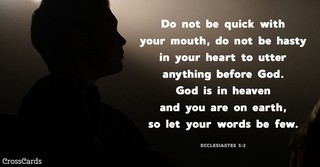- Recent Translations
- All Translations
Ecclésiaste 5:13
Share
Settings
Ecclésiaste 5:13 Meaning and Commentary
There is a sore evil [which] I have seen under the sun
Or "an evil sickness" F13. A sinful disease in the person with whom it is found, and very disagreeable to others to behold; it is enough to make one sick to see it; and what he is about to relate he himself was an eyewitness of: [namely], riches kept for the owners thereof to their hurt;
laid up in barns and granaries, as the fruits of the earth; or in chests and coffers, as gold and silver, for the use and service of the owners of them; and which yet have been to their real injury; being either used by them in a luxurious and intemperate way, so have brought diseases on their bodies, and damnation to their souls; or not used at all for their own good, or the good of others, which brings the curse of God upon them, to their ruin and destruction, both here and hereafter: and oftentimes so it is, and which no doubt had fallen under the observation of Solomon, that some who have been great misers, and have hoarded up their substance, without using them themselves, or sharing them with others, have not only been plundered of them, but, for the sake of them, their lives have been taken away in a most barbarous manner, by cutthroats and villains; sometimes by their own servants, nay, even by their own children. Riches ill gotten and ill used are very prejudicial to the owners; and if they are well got, but ill used, or not used at all, greatly hurt the spiritual and eternal state of men; it is a difficult thing for a rich man to enter into the kingdom of heaven, and a covetous man cannot; if a professor, the word he hears is choked and made unprofitable; he errs from the faith, and pierces himself through with many sorrows now, and is liable to eternal damnation hereafter. The Targum interprets it of a man that gathers riches, and does no good with them; but keeps them to himself, to do himself evil in the world to come.
F13 (hlwx her) "morbus malus", Tigurine version, Vatablus.
